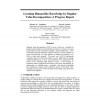Free Online Productivity Tools
i2Speak
i2Symbol
i2OCR
iTex2Img
iWeb2Print
iWeb2Shot
i2Type
iPdf2Split
iPdf2Merge
i2Bopomofo
i2Arabic
i2Style
i2Image
i2PDF
iLatex2Rtf
Sci2ools
105
click to vote
NIPS
1997
1997
Learning Human-like Knowledge by Singular Value Decomposition: A Progress Report
Singular value decomposition (SVD) can be viewed as a method for unsupervised training of a network that associates two classes of events reciprocally by linear connections through a single hidden layer. SVD was used to learn and represent relations among very large numbers of words (20k-60k) and very large numbers of natural text passages (1k70k) in which they occurred. The result was 100-350 dimensional "semantic spaces" in which any trained or newly added word or passage could be represented as a vector, and similarities were measured by the cosine of the contained angle between vectors. Good accuracy in simulating human judgments and behaviors has been demonstrated by performance on multiple-choice vocabulary and domain knowledge tests, emulation of expert essay evaluations, and in several other ways. Examples are also given of how the kind of knowledge extracted by this method can be applied.
| Added | 01 Nov 2010 |
| Updated | 01 Nov 2010 |
| Type | Conference |
| Year | 1997 |
| Where | NIPS |
| Authors | Thomas K. Landauer, Darrell Laham, Peter W. Foltz |
Comments (0)

